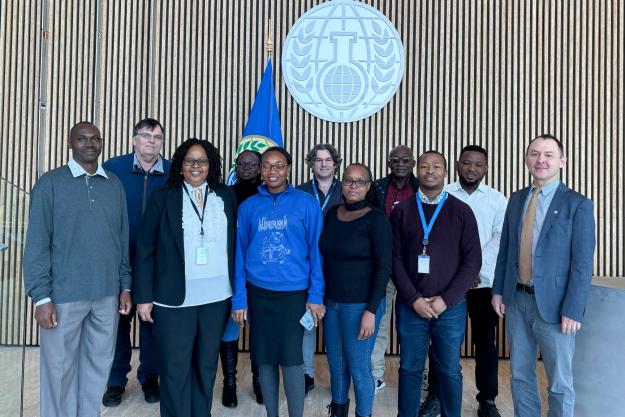
THE HAGUE, Netherlands—20 March 2024— Analytical chemists from Kenya and Nigeria participated in a week-long training course conducted by the Organisation for the Prohibition of Chemical Weapons (OPCW) to strengthen their knowledge and skills in areas relevant to the Organisation’s proficiency testing programme.
The training took place at the OPCW Centre for Chemistry and Technology (ChemTech Centre) from 4 to 8 March 2024 and was conducted in the framework of the OPCW project Assessing and enhancing the capacity of analytical laboratories from African and Latin America and the Caribbean (GRULAC) Member States: towards OPCW designation funded under a voluntary contribution from the United Kingdom of Great Britain and Northern Ireland (UK). The goal of the project, which started in 2019, is to establish an OPCW designated laboratory in Africa.
During the training, six analytical chemists representing laboratories in Kenya and Nigeria enhanced their knowledge and skills in areas such as procedures for analytical protocols, sample preparation and reporting. Successfully performing in the Organisation’s proficiency testing programme is one of the requirements for laboratories to receive designation from the OPCW.
In the last years, both laboratories have shown a significant progress in the OPCW Proficiency Test and the Chemical Weapons Convention Chemical Analysis Competency Test (CCACT) and commitment for continuous improvement. Participants expressed their interest in opportunities for further training courses to refine their skills.
This project is part of the continuous efforts of the OPCW and its Member States to establish an OPCW designated laboratory in Africa.
Background
The OPCW designated laboratories are a linchpin of the Organisation’s verification regime and its capacity to investigate allegations of the use of chemical weapons.
OPCW Designated Laboratories must be able to perform off-site analysis of chemical samples collected by OPCW inspectors from chemical production facilities, storage depots and other installations, or from the site of an alleged use of chemical weapons.
These laboratories offer the necessary assurance to our States Parties that chemical analyses needed to make determinations or to clarify issues occurring during OPCW deployments are carried out competently, impartially, and with unambiguous results.
The ChemTech Centre, inaugurated in 2023 in presence of His Majesty King Willem-Alexander of the Netherlands, enhances the OPCW’s ability to conduct chemical research and analysis. This significantly reinforces the Organisation’s verification regime and inspection capabilities of chemical industries around the world. In addition, an increasing number of capacity building activities are being delivered through the Centre, including chemical emergency response trainings and analytical skills development courses for experts from Member States.
As the implementing body for the Chemical Weapons Convention, the OPCW, with its 193 Member States, oversees the global endeavour to permanently eliminate chemical weapons. Since the Convention’s entry into force in 1997, it is the most successful disarmament treaty eliminating an entire class of weapons of mass destruction.
In 2023, the OPCW verified that all chemical weapons stockpiles declared by the 193 States Parties to the Chemical Weapons Convention since 1997 — totalling 72,304 metric tonnes of chemical agents — were irreversibly destroyed under the OPCW’s strict verification regime.
For its extensive efforts in eliminating chemical weapons, the OPCW received the 2013 Nobel Peace Prize.
